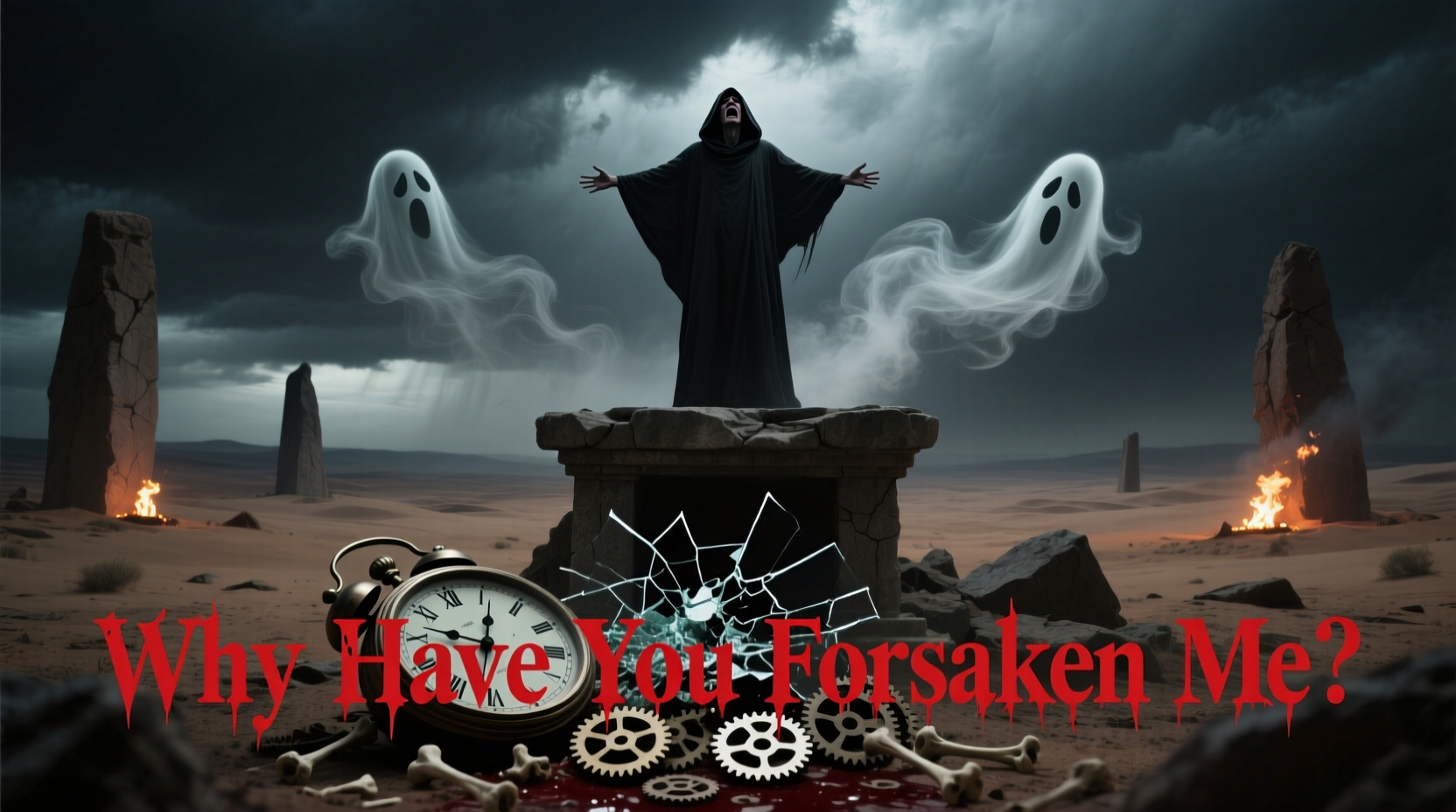The haunting opening line of System of a Down’s “B.Y.O.B.”—“Why have you forsaken me?”—is not just a dramatic vocal flourish. It is a deliberate invocation of spiritual anguish, political disillusionment, and collective trauma. Though often mistaken as the title of a standalone song, this line emerges from one of the band’s most politically charged tracks, released in 2005 on their album *Mezmerize*. To understand why Serj Tankian sings these words with such raw intensity, we must look beyond the surface of the music and into the band’s Armenian heritage, their critique of war, and the broader cultural resonance of abandonment.
The Origin of the Phrase

“Why have you forsaken me?” is a direct quote from the Bible, specifically Matthew 27:46, where Jesus cries out from the cross in Aramaic: “Eli, Eli, lama sabachthani?” This moment captures divine abandonment at humanity’s darkest hour. System of a Down repurposes this cry not for religious doctrine, but as a metaphor for betrayal—by governments, by institutions, and by those in power who send young people to war under false pretenses.
The phrase sets the tone for “B.Y.O.B.” (Bring Your Own Bombs), a scathing indictment of the Iraq War and the military-industrial complex. The song opens not with aggression, but with vulnerability—a soul questioning a higher order that permits senseless violence. This contrast between spiritual despair and political fury is central to the band’s artistic identity.
“Art should disturb the comfortable and comfort the disturbed. That line does both.” — Henry Rollins, musician and social critic
Historical and Cultural Context
System of a Down was formed by four Armenian-American musicians whose families were shaped by genocide, displacement, and survival. The 1915 Armenian Genocide, during which an estimated 1.5 million Armenians were systematically exterminated by the Ottoman Empire, remains unrecognized by Turkey to this day. This legacy of erasure and denial permeates the band’s work.
When Serj Tankian sings “Why have you forsaken me?”, he channels not only the pain of soldiers sent to die in unjust wars but also the voice of generations of victims abandoned by the international community. The cry echoes through history—from Armenian widows watching their families vanish, to Iraqi civilians caught in modern bombardments. It is a universal lament of the powerless facing systemic betrayal.
Political Message Behind the Music
“B.Y.O.B.” was released at the height of the Iraq War, a conflict built on contested intelligence and widespread public skepticism. The lyrics mock the hypocrisy of warmongering leaders: “Why don’t presidents fight the war? / Why do they always send the poor?” These lines expose class disparity in military service and challenge the morality of sending conscripted youth to fight while leaders remain safe.
The opening cry—“Why have you forsaken me?”—frames the entire song as a prayer unanswered. It positions the soldier, the civilian, and the protester as figures crying out to a silent or indifferent authority. The band doesn’t offer solutions; instead, they amplify the scream of moral outrage. In doing so, they align themselves with a tradition of protest music—from John Lennon to Rage Against the Machine—that uses art as resistance.
How “Forsaken” Fits Into System of a Down’s Broader Discography
Themes of abandonment and injustice recur throughout the band’s catalog:
- “Chop Suey!” – Explores personal crisis and societal pressure, ending with the same biblical quote.
- “Holy Mountains” – A tribute to Armenian heritage and the pain of cultural erasure.
- “Genocidal Humanoidz” – Directly addresses state-sponsored violence and denial.
In each case, the band uses spiritual language not to preach faith, but to highlight the void left when justice fails. The repetition of “Why have you forsaken me?” across songs suggests a persistent, unresolved wound—one that transcends any single war or generation.
Listener Interpretation and Emotional Impact
Many fans initially believed “Why have you forsaken me?” was the title of its own song, a testament to how powerfully the line resonates. For some, it evokes personal struggles with depression, isolation, or loss of faith. For others, it reflects outrage at government deception or environmental collapse. The ambiguity is intentional—System of a Down crafts lyrics that are simultaneously specific and universal.
The choice to begin “B.Y.O.B.” with a near-whispered plea, followed by explosive instrumentation, mirrors the internal conflict of someone grappling with betrayal. It forces the listener to confront discomfort before offering catharsis through noise. This structure is not accidental; it mirrors the psychological journey of realizing one has been misled by trusted institutions.
Mini Case Study: A Veteran’s Perspective
James Rivera, a U.S. Army veteran who served two tours in Iraq, recalls first hearing “B.Y.O.B.” during a leave in 2006. “That opening line hit me like a punch,” he said. “I didn’t know if I was angry at the enemy, my commanders, or God. I felt forsaken—not just by policy, but by the idea that what I was doing meant something.” He later played the song at a veterans’ support group meeting. “It gave voice to things we couldn’t say out loud.”
This anecdote illustrates how System of a Down’s music functions as both protest and therapy. The band doesn’t claim to speak for soldiers or survivors, but they create space for their pain to be heard.
Do’s and Don’ts of Interpreting Protest Music
| Do | Don’t |
|---|---|
| Consider the artist’s background and lived experience | Assume the song is only about one issue (e.g., just the Iraq War) |
| Listen to lyrics in context with melody and delivery | Dismiss emotional delivery as mere theatrics |
| Research historical references in the song | Take lyrics at face value without deeper inquiry |
| Reflect on how the message applies today | Believe protest music is only relevant in its original era |
Step-by-Step Guide to Understanding the Song’s Layers
- Listen to the full track silently. Focus only on the vocals—especially the opening line.
- Read the lyrics aloud. Notice the shift from personal anguish to collective accusation.
- Research the Iraq War timeline (2003–2011). Understand the political climate when the song was written.
- Learn about the Armenian Genocide. Explore how historical trauma influences the band’s worldview.
- Compare “B.Y.O.B.” to other protest songs. Consider similarities with “Masters of War” (Dylan) or “Killing in the Name” (RATM).
- Reflect on current events. Ask: Who feels “forsaken” today? Refugees? Climate victims? Marginalized communities?
Frequently Asked Questions
Is “Why Have You Forsaken Me” a real song by System of a Down?
No, it is not a standalone song. It is the opening line of “B.Y.O.B.” from the 2005 album *Mezmerize*. Due to its emotional weight, many fans mistakenly believe it is a separate track.
What does “B.Y.O.B.” stand for?
The acronym stands for “Bring Your Own Bombs,” a satirical twist on “Bring Your Own Beer.” It critiques the normalization of war and the privatization of violence.
Has the band explained the meaning behind the opening line?
While the band rarely gives literal explanations, Serj Tankian has stated in interviews that the line reflects “the cry of the innocent in times of war.” He emphasizes that it is a question directed at power, not just a religious reference.
Conclusion: A Cry That Still Echoes
System of a Down sings “Why have you forsaken me?” because the question remains unanswered. In an age of endless conflict, political deception, and inherited trauma, the cry is not confined to one war or one generation. It belongs to anyone who has looked up at the sky and wondered why no one came to help.
The genius of the band lies in their ability to fuse the sacred with the subversive, turning ancient lament into modern protest. When Tankian utters those words, he isn’t performing—he’s testifying. And in doing so, he invites us to listen, reflect, and perhaps ask the same question in our own lives.









 浙公网安备
33010002000092号
浙公网安备
33010002000092号 浙B2-20120091-4
浙B2-20120091-4
Comments
No comments yet. Why don't you start the discussion?